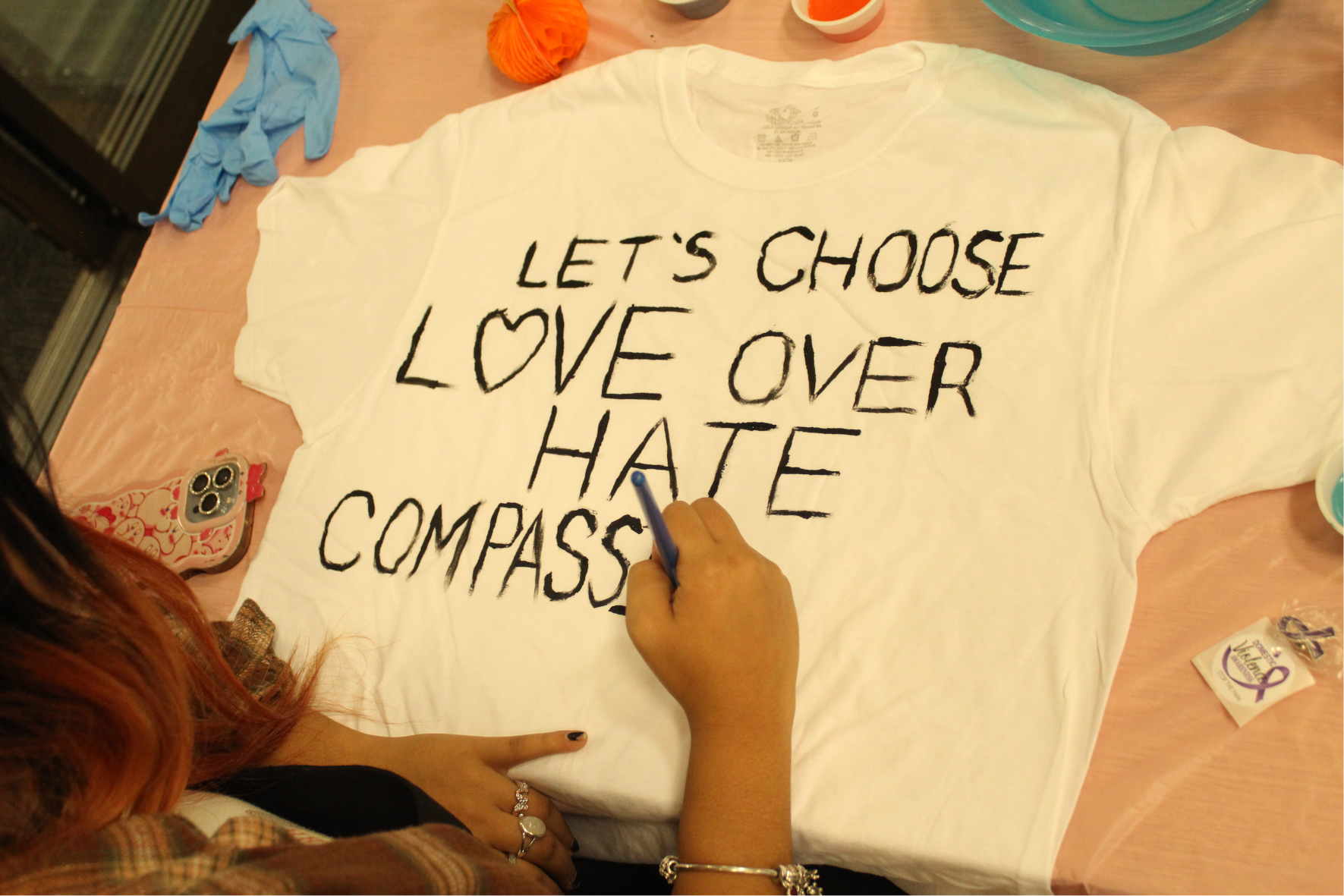October has been designated the month to recognize victims of domestic violence and to raise awareness about the impact domestic violence has on thousands of people. This month acknowledges domestic violence survivors and allows victims to speak out about what they experienced and ways they learned they were in a domestically violent relationship.

Rory Sellers/THUNDERWORD
An array of shirts students have made in the past calling out domestic violence.
Millions of Americans live silently fearing within their own home that the person they love the most will hurt them. Many children that are exposed to violence in their homes will suffer from mental health problems, or they risk being violent in their future relationships.
On campus, the women’s program hosts the Clothesline Project which is an interactive experience to unify survivors of domestic and partnership abuse. Staff and students are invited to share their voice in standing up against violence by painting anonymous messages, stories, and positive affirmations on a t-shirt that will be displayed in Building 6.
Although there has been progress in reducing the number of domestic violence victims there is still a significant amount of people that suffer abuse by their intimate partner. More than 10 million victims are abused annually; one in three women and one in four men are physically abused by their intimate partner; and one in five women and one in seven men have been severely injured by their partners.
Often children that are exposed to domestic violence in their homes will suffer from mental health problems like depressive and anxious disorders. As to their physical health, they could even suffer from diabetes, obesity, heart disease, poor self-esteem, and many more problems. You can read more about it in the National Child Traumatic Stress Network.
Those that have suffered through domestic violence have felt the need to speak up about their experience of domestic violence, and for their safety they will stay anonymous.
One anonymous source starts off by explaining how it started, “I didn’t know what domestic violence was when I first got married with my husband. I was with him since I was 16 and stayed with him for 36 years. But throughout that marriage he was controlling and emotionally abusing me. Drugs and alcohol played a role in all of this for years.”
The victim went on to talk about many of the other things that both her and her son went through, emotionally and financially, and the relief they felt when they finally were able to get out of that relationship.
As a student here at Highline she was able to get the wish program section-8 which pays a portion of your rent and you pay the other portion. Highline offers many of these programs to students that find themselves in a situation where they are struggling financially or are homeless.
Many of these victims are children and many of them don’t open up about that experience not because it’s hard to talk about, but it’s hard to feel free to talk about it without feeling ignored or feeling like people are only helping them out of pity.
“I was beaten as a child for the littlest things: if I didn’t do my homework correctly, if it was wrinkled,” revealed an anonymous source. “And the way [my father] used to punish me was placing sharp seeds and had me kneel on them, and would place me on high places, he would also beat my mother up. Living in a different country that used to see domestic violence as a normal thing made it hard at first, and I went through that up until I was 10.”
All the victims recommend following your gut feeling even though it is hard to trust it, because it can save you when you least expect it.
“Follow your gut, and listen to what others are telling you,” said an anonymous source. “You might not be ready to admit it’s going on but the sooner you do the better you are off. It’s not easy to leave, but reach out for help. There is always someone out there that can help, if it’s a friend or going to the police, or a teacher. Sometimes just a random stranger can help. There’s always a way out even if you’re told there isn’t.”
There are many programs where people can reach out for help, but unfortunately not many people know about them, or don’t have enough information on what to do when they find themselves in a situation where they fear for their lives.
In addition to the support Highline College offers there is also a National Domestic Violence Hotline you can use to call or text when you are in need of help. The phone number to contact is 800-799-7233 and to send an anonymous message is 88788, they speak up to 200 different languages as well.

